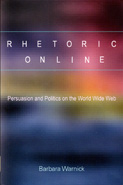Warnick then applies a field-dependent model of online credibility to analyze Indymedia, a popular Web site (really, a node that coordinates many other sites) that deliberately positions itself as outside the institutions and values of corporate-owned or government-controlled news outlets.
Indymedia encourages users all over the world to submit stories and makes it easy for users to do so through open copyright and editorial policies. Authors do not identify themselves, perhaps both because of the collaborative nature of the site and also because of fears of political repression. Indymedia has no home office or fixed editorial board.
So how do users judge the credibility of stories on Indymedia? Warnick examines an exchange of user comments following an Indymedia story about the FBI-involved shooting death of Ojeda Rios, a leader of the Puerto Rican independence movement. While some users called for evidence to support the story's argument that the FBI simply allowed Rios to bleed to death after shooting him, other users demanded evidence to substantiate the story's charges. Still others relied on the Indymedia principle of users having to be responsible for finding out facts for themselves once stories made them aware of otherwise-unreported (or distortedly-reported) events.
Dissonance among individual users’ reading practices, values, and expectations as demonstrated by the archived comments on the Rios story brought to the fore issues of authority, grounds, warrants, and what the responsibilities of the producers and consumers of news media should be. As Warnick’s Indymedia case study establishes, "credibility" is a shorthand term for a series of judgments—judgments that are enmeshed in practices and values. As Warnick puts it, "The notion of field dependence can be shown to function very effectively as a mechanism for explaining how epistemological contexts and the evaluation standards that grow out of them play a role in online knowledge production practices" (67). Consequently, rhetorical critics should, when examining ethical appeals in online discourse, consider how the field in which those discourses participate judges credibility. This will provide a reasonable yet flexible critical standard for the type of case studies Warnick urges.
The next of Warnick's case studies in Chapter 4 examines interactivity—the ability of users to affect the nature of their experiences with a given Web text.
